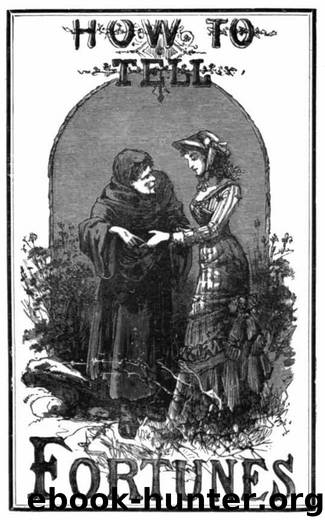How to Tell Fortunes Containing Napoleon's Oraculum and the Key to Work It by Aaron A. Warford

Author:Aaron A. Warford [Warford, Aaron A.]
Language: eng
Format: epub
Published: 2016-09-05T22:00:00+00:00
The following passage is in the “Merry Devil” of Edmonton, 1631:
“I hear the watchful dogs
With hollow howling tell of thy approach.”
58. If you break your shoe-string, look out for your sweetheart, for she will bestow her love upon a stranger.
59. A flake of soot hanging at the bars of the grate, denotes the visit of a stranger, like the fungus of a candle, from the part of the country nearest the object.
Dr. Goldsmith, in his “Vicar of Wakefield,” among the omens of his hero’s daughters, tells us “purses bounded from the fire.” In some parts of England, the cinders that bound from the fire are carefully examined by old women and children, and according to their respective forms are called either coffins or purses ; and consequently thought to be presages of death or wealth.
A coal, says Grose, in the shape of a coffin, flying out of the fire towards any particular person, betokens their death not far off.
Cowper alludes to this superstition in the following lines in his “Winter Evening:”
“Me oft has fancy, ludicrous and wild,
Sooth’d with a waking dream of houses, towers,
Trees, churches, and strange visages express’d
In the red cinders, while with poring eye
I gazed, myself creating what I saw.
Nor less amused have I quiescent watch’d
The sooty films that play upon the bars,
Pendulous, and foreboding in the view
Of superstition, prophesying still,
Though still deceived, some stranger’s near approach.”
60. To drop a slice of bread, with the buttered side down, is a sign that a visitor will come hungry.
61. To eat up all the food which is on the table at tea-time, is a sign that the morrow will be a fair day.
62. In olden times it was not considered a good omen to find money. Melton says that “it is a sign of ill-luck to find money.” We have seen superstitious people, at the present day, keep for luck any piece of money they found, but Greene, in his “Art of Cony-Catching,” a very old work, tells us: “’Tis ill luck to keep found money.” Therefore it must be spent. Mason, in his “Anatomie of Sorcerie,” 1612, enumerating our superstitions, mentions as one omen of good luck, “if drink be spilled upon a man: or if he find old iron.” Hence it is accounted a lucky omen to find a horseshoe. (See 8.)
63. The ancients thought there was luck in odd numbers. In setting a hen, says Grose, the good women hold it as an indispensible rule to put an odd number of eggs. All sorts of remedies are ordered to be taken, three, seven, or nine times. Salutes of cannon consist of an odd number. Notwithstanding these opinions in favor of odd numbers, the number thirteen is considered very ominous. (See 55.)
Download
This site does not store any files on its server. We only index and link to content provided by other sites. Please contact the content providers to delete copyright contents if any and email us, we'll remove relevant links or contents immediately.
Evelina by Fanny Burney(26874)
Evelina, Or, the History of a Young Lady's Entrance into the World by Fanny Burney(26288)
Twilight of the Idols With the Antichrist and Ecce Homo by Friedrich Nietzsche(18632)
Pale Blue Dot by Carl Sagan(5008)
The Perks of Being a Wallflower by Stephen Chbosky(4648)
Dune 01 Dune by Frank Herbert(4405)
Double Down (Diary of a Wimpy Kid Book 11) by Jeff Kinney(4272)
Man and His Symbols by Carl Gustav Jung(4135)
Walking by Henry David Thoreau(3962)
Separate Beds by LaVyrle Spencer(3827)
Ficciones by Jorge Luis Borges(3635)
FOUNDATION AND EMPIRE by Isaac Asimov(3587)
The 101 Dalmatians by Dodie Smith(3511)
Mystery at School by Laura Lee Hope(3484)
Anna and the French Kiss by Stephanie Perkins(3363)
120 Days of Sodom by Marquis de Sade(3275)
Some Prefer Nettles by Tanizaki Junichiro(2891)
The Little Prince by Antoine de Saint-Exupéry(2878)
My Ántonia by Willa Cather(2846)
